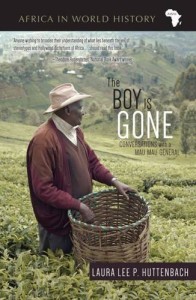What is consistent with Human behavior across the world and across centuries is the desire for freedom and independence. No matter how much someone thinks that their way of life is better, putting restrictions on freedom to own, freedom to express, and freedom to travel will always elicit resistance. Isn’t that what we are seeing in Wayward Pines’ futuristic civilization until now?
Nelson Mandela and Mahatma Gandhi managed to get world attention for their struggles against the British Government, but those were not the only places where Britain experienced resistance or resorted to force to subjugate the local population.
 The Boy Is Gone: Conversations with a Mau Mau General (Ohio Africa in World History)
The Boy Is Gone: Conversations with a Mau Mau General (Ohio Africa in World History)
Author: Laura Lee P. Huttenbach Series: Ohio Africa in World History Paperback: 256 pages Publisher: Ohio University Press (June 5, 2015) ISBN: 0896802914, 978-0896802919
Laura Lee P. Huttenbach travels the same lands that Kithinji explored with his herds as a boy. She hears the stories of Meru culture as a man from MThambu, and tales of grit and suffering in the forest from Nkungi (The General) as the Mau Mau fighter.
Laura Lee P. Huttenbach, an Atlanta native and a Graduate of University of Virginia has written about her travels in Africa, South America, and the Middle East. She is the founder of The General History Project, a 501 (c)(3) organization, which seeks to record the life stories of aging community leaders in their own words, promoting cultural awareness and creating historical documentation and enriching the life of all people.
Huttenbach first traveled to Africa in 2006 on a backpacking trip. Her experiences and meeting with the General created a disconnect with what she had heard and read about ‘savage Africa’. She could not believe that the people she met now could ever exhibit the brutality as recorded by Europeans. In 2009 Huttenbach returned to hear the General and the other side of the story of East Africa’s struggle for independence.
Africa, especially East Africa, holds a special attraction for me. My grandfather spent more than two decades in Uganda and we grew up with stories from the British East Africa that our grandmother narrated. The 3 day travel from the interiors to Mombasa port in Kenya, the stops at Dar-e-Salam, Tanganyika; the bombing threats on the sea journey during the second world war; and the threat of the locals and fear of being caught in the crossfire. There was so much more I wanted to know of the life in British East Africa, but I was not fortunate enough to see or ever meet my grandfather.
This patiently researched and written account of the stories from The General by Huttenbach surely brings to life the times that my grandfather and scores other spent in British East Africa in 50s and the experiences that we have only heard second hand.
The Boy is Gone talks about the circumstances that led the people to revolt and join the Mau Mau. The feeling of being sidelined in your own land is not something people can live with for a long time. But declaring an emergency and punishing people by death without a trial could tip anyone toward retaliation. The worst part of the British rule in colonies was that they were able to turn the locals against their own, and no matter who won, the Africans were the ones dying.
The Boy is Gone is a story of a Meru boy who fought for the right to till and own his land by becoming a part of the Mau Mau rebellion in East Africa. The Boy is Gone is the story of a revolutionary who became a politician and participated in shaping the country after Kenya gained independence. The Boy is Gone is a story of an astute businessman who supported not only his family but his village and scores of his countrymen by building a co-operative movement. Above all, The boy is Gone is the story of Meru and African culture that will shatter all the myths and tales of savagery propagated by European propaganda to hide its brutality against the locals.